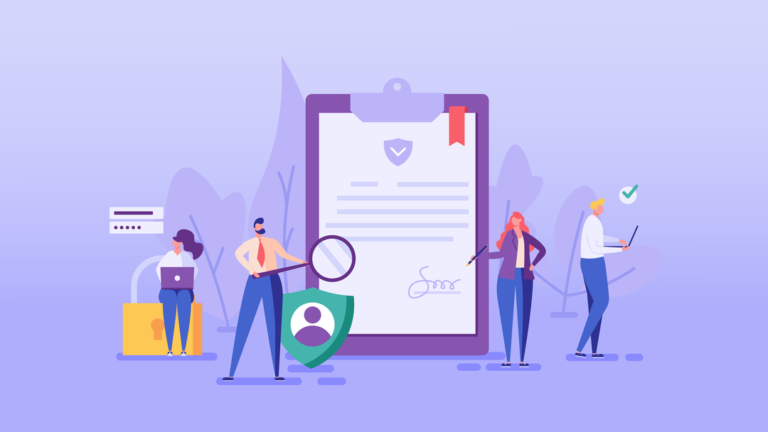The volume of information that we use on a routine basis can take time to quantify. However, most estimates indicate that the global corporate data generated doubles every 1.2 years. It’s reasonable to conclude that your company’s digital footprint is expanding significantly every year. The number of sensitive information that your company may hold, the complications in maintaining it, and its potential value are all things that cybercriminals are well aware of.
Thus, your ability to safeguard corporate data needs to be effective. However, maintaining data security without compromising your key strengths is challenging enough. Most businesses operate on low budgets and with few resources. So, what you can do is outsource the process of guaranteeing data security throughout your entire through your business with the help of a credible accounting software.
Ensuring data privacy and security in record tracking is essential to protect sensitive information from unauthorized access and misuse.
Here are some best practices that can help to ensure data privacy and security in record tracking.
● Use secure storage
Storing records in a secure location is essential to ensuring data privacy and security. This can include using encrypted hard drives, secure file servers, or cloud-based services that offer robust encryption and access controls. Encryption is the process of converting data into a coded language that can only be read by authorized individuals with a decryption key. This ensures that even if the data is intercepted or stolen, it is unreadable and unusable to anyone who doesn’t have the proper decryption key.
● Limit access
Limiting access to records ensures that only those who need access can view and manipulate the data. This can be accomplished through various user authentication measures, such as password protection, two-factor authentication, and access control lists. Password protection requires a user to enter a password to access the data. In contrast, two-factor authentication requires a user to enter a second form of identification, such as a code sent to their phone or a fingerprint scan. Access control lists enable administrators to set permissions for each user, determining what data they can access and what actions they can perform.
● Implement data protection policies
Implementing policies and procedures to protect data ensures that the data remains secure and confidential. This can include regular data backups, establishing guidelines for the secure transfer and sharing of data, and implementing a data retention policy that outlines how long data should be kept and when it should be deleted.
● Monitor access
Monitoring access to records is critical for detecting any unauthorized access or suspicious behaviour. This can include logging access attempts, setting up alerts for unusual activity, and using intrusion detection and prevention systems that monitor for suspicious network activity.
● Regularly update security measures
Regularly updating security software, such as firewalls and anti-virus software, is essential to ensure that data remains secure. Additionally, regularly patching any vulnerabilities or weaknesses helps to protect against potential attacks.
● Educate employees
Educating employees on best practices for data privacy and security helps to ensure that everyone is on the same page when it comes to keeping data secure. This can include training on how to identify phishing attempts and other forms of cyber attacks, as well as establishing clear guidelines for the handling of sensitive information.
Overall, implementing these practices can help to ensure that record tracking systems are secure and protect sensitive information from unauthorized access and misuse.
How Cloud Accounting can heighten Data Security
- Cloud accounting software can be a powerful tool for managing financial records and tracking transactions, but it’s essential to ensure that data privacy and security are maintained. Here are some steps that can be taken to ensure data privacy and security in record tracking with the help of cloud accounting software:
- Choosing a reputable cloud accounting software provider is essential for ensuring data privacy and security. Look for a provider that has a track record of security and privacy, offers robust encryption and access controls, and regularly updates its software to patch vulnerabilities.
- Using strong passwords for accessing the cloud accounting software is critical to prevent unauthorized access. Ensure that passwords are complex and include a mix of letters, numbers, and symbols.
- Multi-factor authentication adds an extra layer of security by requiring users to provide two or more forms of authentication to access the software. This can include a password, a fingerprint scan, or a code sent to a mobile device.
- Monitoring user activity within the cloud accounting software can help detect any unauthorized access or suspicious activity. Keep track of who is accessing the data, when they are accessing it, and what they are doing with the data.
- Regularly backing up data is essential to ensure that data is not lost in the event of a security breach or system failure. Most cloud accounting software providers offer automatic backups, but confirming that the backups are being done regularly is essential.
- Encrypting data is essential for ensuring data privacy and security. Most cloud accounting software providers offer encryption as a standard feature, but it’s essential to confirm that data is being encrypted both in transit and at rest.
Any business whether small, medium or large needs to have the ability to exercise access control on its accounting software usage. With GenieBooks, you can implement cybersecurity measures such as Segregation of Duties (SoD) to secure the data in ERP systems better along with complete visibility of your company’s spending with comprehensive data, charts, graphs, and custom reports.


Comments are closed.